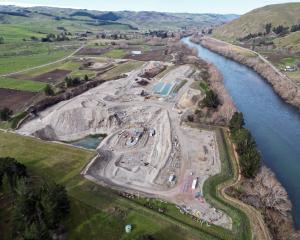New Zealand will benefit financially from Meridian Energy's proposed Project Hayes wind farm through a global emissions trading system, an Environment Court appeal hearing was told yesterday.
Economist and Covec Ltd director Tim Denne, of Auckland, explained to the court how reductions in greenhouse gas emissions could lead to the international trading of assigned emission units, or carbon credits, under the Kyoto Protocol.
Each country signed up to the protocol was credited with a certain amount of such units, which they could trade with other countries if not used, he said.
Dr Denne said New Zealand had 300 million tonnes of units to be used over five years, and the likes of Project Hayes could make some of those redundant for use in the country and therefore free to trade.
"If New Zealand needs fewer of them [its assigned units], because it has reduced its emissions through the likes of renewable energy, than those units are freed up on the market for other [countries] to purchase them," he said.
Last December Meridian Energy's Te Apiti wind farm was offered a contract to sell its emission units to the Netherlands Government, which it did for $NZ10.50 a unit.
Dr Denne said what was an international initiative to reduce harmful effects of climate change had therefore turned into a financial benefit for New Zealand.
He said of all ways New Zealand could reduce its emissions, the development of renewable energy such as Meridian's proposed wind farm, was a cheap option which made economic sense.
"It is in New Zealand's economic best interest to reduce its emissions when it can do so for a lower cost than the other means of compliance with the protocol.
Reducing emissions domestically either reduces the number of Kyoto units which have to be purchased for New Zealand to be compliant, or establishes a surplus of units which can be sold," his written evidence stated.
Dr Denne's evidence also stated the Government had proposed to establish its own Emissions Trading System (ETS) within the New Zealand Energy Strategy (NZES), in order to provide energy companies a financial incentive to develop renewable energy.
It stated companies which produced energy using coal, gas, oil, and geothermal methods would have to surrender an allowance based on an amount for each tonne of emissions produced.
"This would result in increased profitability, especially for electricity generation with no emissions, because revenues will increase but costs will not," Dr Denne's evidence stated.
During cross-examination, Maniototo Environmental Society counsel Ewan Carr asked Dr Denne whether surrendering allowances would force energy companies to increase retail costs for consumers.
Dr Denne said there would be an increased cost for such companies, but it was not known whether it would be passed on to consumers.
Meridian counsel could not be contacted yesterday about whether the company intended to sell carbon credits for Project Hayes.












